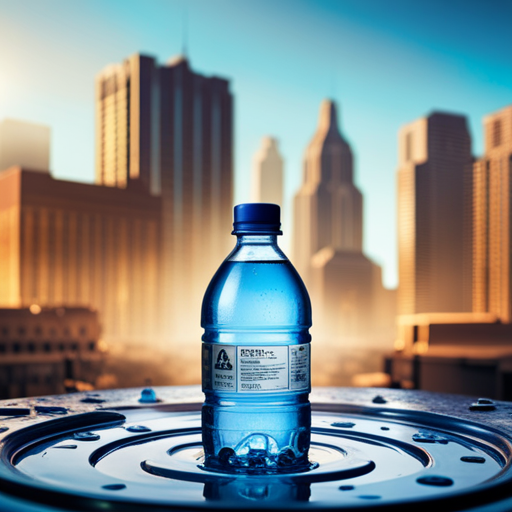Do you rely on bottled water for your daily hydration needs? While it may seem like a healthier and more convenient option, have you ever considered the potential risks associated with its shelf life?
Many people are unaware that plastic bottles can break down over time, contaminating the water with harmful chemicals. As a result, it’s crucial to understand the shelf life risks of bottled water and take necessary precautions to ensure its safety.
In this article, we explore the potential dangers of drinking expired bottled water, including the factors that affect its lifespan. We also provide safety precautions that you can take to avoid any potential health risks.
By the end of this article, you will have a better understanding of the importance of monitoring the shelf life of your bottled water and how to identify if it has gone bad. So, let’s dive into the topic and ensure that you are drinking safe and healthy water.
Key Takeaways
– Unopened water doesn’t go bad, but the plastic bottle can break down over time and leak chemicals into the water.
– Microscopic bits of plastic can leak into the water after two years, making it dangerous to drink, especially in hot climates.
– Bottled water is safe to consume within two years of purchase, but signs that it has gone bad include anything floating in the water or an off or cloudy color or smell.
– Opened water can go bad due to bacteria entering from the mouth or air, giving it a foul smell. It’s better to err on the side of caution and be safe than to risk drinking potentially contaminated water.
Bottled Water Shelf Life
If you keep unopened bottled water for too long, the plastic bottle may break down and release harmful chemicals into the water, making it unsafe to drink. Plastic contamination can occur when microscopic bits of plastic leak into the water, especially in hot climates.
Refrigeration doesn’t extend the shelf life of unopened water very much, so it’s important to pay attention to the expiration date and dispose of the water properly if it has passed. Disposal methods for expired bottled water include recycling the plastic bottle or safely disposing of it in the trash.
Taking steps to prolong bottled water’s lifespan, such as not opening it until ready to drink and choosing BPA-free products, can also help prevent plastic contamination. Remember, it’s better to be safe than sorry when it comes to drinking potentially contaminated water.
Factors Affecting Lifespan
One important factor to consider when it comes to the lifespan of bottled water is the type of plastic used in the bottle. Some plastic bottles contain Bisphenol A (BPA), which can leach into the water over time and be harmful to your health. It also has a negative environmental impact as plastic bottles contribute to the growing problem of plastic pollution in our oceans and landfills.
To minimize the environmental impact of bottled water, it’s important to choose bottles that are made from BPA-free materials. These bottles are typically labeled as such, making it easy to identify them on store shelves. Another way to reduce your environmental impact is to recycle your plastic bottles properly. By doing so, you’re helping to keep plastic out of our landfills and oceans, and you’re also conserving resources by allowing the plastic to be repurposed.
By making conscious choices about the types of plastic you use and how you dispose of them, you can help to ensure that your bottled water is safe for both you and the environment.
Safety Precautions
To ensure that you’re consuming clean and healthy water, it’s important to take safety precautions when handling and storing your bottled water.
One of the most crucial steps is to choose BPA-free options when buying bottled water. Bisphenol A is an organic compound commonly used in the production of plastic bottles, and it can leach into the water, causing potential health risks.
Proper storage is also critical to maintaining the quality of your bottled water. Avoid storing it in hot areas like garages, and instead, keep it in a climate-controlled room like a kitchen.
Additionally, don’t open the bottle until you’re ready to drink it to prevent bacteria from entering.
With these safety precautions in place, you can be confident that your bottled water is safe to consume and won’t pose any health risks.
Conclusion
So, is your bottled water safe? The answer is not a simple yes or no.
While unopened bottled water may not go bad, the plastic bottles themselves can break down over time and release harmful chemicals into the water. The shelf life of bottled water can be affected by various factors such as exposure to sunlight, temperature changes, and the type of plastic used in the bottle.
To ensure the safety of your bottled water, it’s important to check the expiration date and store it properly. Avoid exposing it to direct sunlight or extreme temperatures, and consider using a reusable water bottle made of safer materials such as glass or stainless steel.
By taking these precautions, you can prolong the lifespan of your bottled water and reduce the risk of harmful chemicals leaching into your drinking water.
